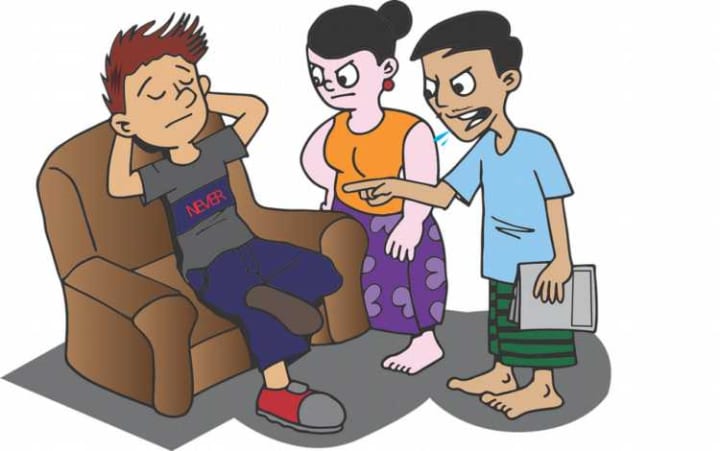
Laziness is a common trait observed in humans, and it is often blamed for a lack of productivity, missed opportunities, and even health problems. Despite the many negative consequences of laziness, it is a prevalent trait in our species, and understanding its underlying causes and triggers can help us to overcome it.
One of the main reasons why humans are lazy is that we are hardwired to conserve energy. Our bodies have evolved to be efficient, and we are naturally inclined to avoid unnecessary physical exertion. This evolutionary trait was beneficial for our ancestors, who had to conserve energy in order to survive. However, in modern times, it can lead to a lack of motivation and a tendency to procrastinate.
Another factor that contributes to laziness is the availability of modern conveniences. Technology has made our lives easier and more comfortable, but it has also reduced the amount of physical activity required to complete tasks. For example, we can use cars to travel long distances, elevators to avoid climbing stairs, and remote controls to change the TV channel. While these conveniences are undoubtedly beneficial, they can also contribute to a sedentary lifestyle and a lack of motivation to engage in physical activity.
Furthermore, the abundance of distractions in modern life can make it difficult to stay focused and motivated. Social media, video games, and streaming services are all designed to be addictive, and they can quickly consume our attention and sap our motivation. The constant barrage of notifications, messages, and updates can also create a sense of overwhelm, leading to a feeling of helplessness and a lack of motivation to engage with the world.
Another factor that contributes to laziness is a lack of purpose or direction. When we don't have a clear goal or sense of purpose, it can be difficult to muster the motivation to take action. This lack of direction can be caused by a variety of factors, including boredom, a lack of confidence, or a feeling of being stuck in a rut. In such cases, it can be helpful to set clear goals and take small steps towards achieving them, which can help to build momentum and increase motivation.
Finally, it is worth noting that laziness is not always a negative trait. In some cases, it can be a sign of burnout or a need for rest and recuperation. When we push ourselves too hard for too long, we can become exhausted and lose motivation. In such cases, it is important to recognize the need for rest and take the time to recharge our batteries.
In conclusion, laziness is a complex and multifaceted trait that is influenced by a range of factors, including our evolutionary history, modern conveniences, distractions, a lack of purpose, and burnout. While laziness can be a hindrance to productivity and progress, it is not always a negative trait and can sometimes be a sign of a need for rest and rejuvenation. By understanding the underlying causes of laziness, we can take steps to overcome it and achieve our goals.

One of the main ways in which laziness can negatively impact our lives is through a lack of productivity. When we are lazy, we tend to procrastinate and put off important tasks, leading to a backlog of work that can become overwhelming. This can cause stress and anxiety, and in extreme cases, it can lead to missed deadlines, lost opportunities, and even job loss. Furthermore, a lack of productivity can lead to a sense of dissatisfaction and a feeling of being unfulfilled, which can take a toll on our mental health.
Another way in which laziness can affect our lives is through missed opportunities. When we are lazy, we may be less likely to take risks or pursue new opportunities, leading to a stagnant and unfulfilling life. We may miss out on career opportunities, personal relationships, or new experiences that could enrich our lives and broaden our horizons. In the long run, this can lead to regret and a sense of unfulfilled potential.
Moreover, laziness can also have a negative impact on our physical health. When we are lazy, we may be less likely to engage in physical activity or exercise, leading to a sedentary lifestyle and a range of health problems, including obesity, heart disease, and diabetes. A lack of physical activity can also lead to weakened muscles and joints, making us more susceptible to injury and falls.
In addition to physical health problems, laziness can also have a negative impact on our mental health. When we are lazy, we may experience feelings of guilt, shame, and low self-esteem, which can lead to depression and anxiety. Furthermore, a lack of productivity and a sense of unfulfillment can lead to a feeling of hopelessness and a lack of motivation, which can exacerbate mental health problems.
Finally, laziness can also have a negative impact on our relationships. When we are lazy, we may be less likely to engage in social activities or spend time with loved ones, leading to a sense of isolation and loneliness. Furthermore, a lack of productivity can strain relationships with colleagues, friends, and family members, leading to conflicts and misunderstandings.
In conclusion, while laziness may seem like a harmless trait, it can have significant negative consequences on our lives. Laziness can lead to a lack of productivity, missed opportunities, and health problems, as well as negative impacts on our mental health and relationships. By recognizing the negative impact of laziness and taking steps to overcome it, we can lead more fulfilling, healthy, and productive lives.





Comments
Egemen is not accepting comments at the moment
Want to show your support? Send them a one-off tip.